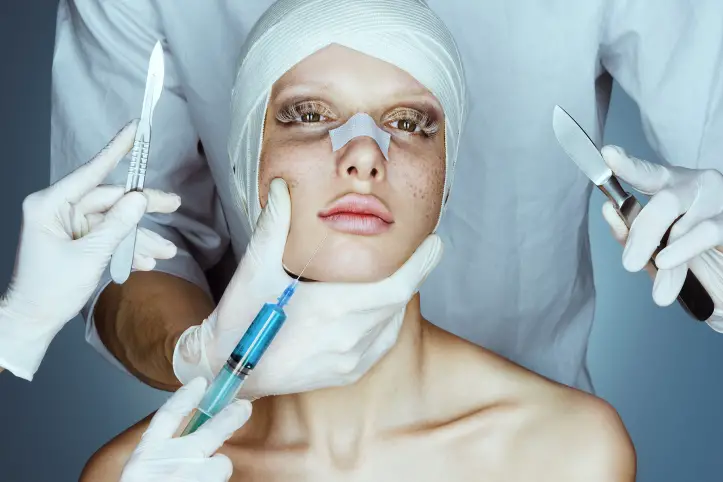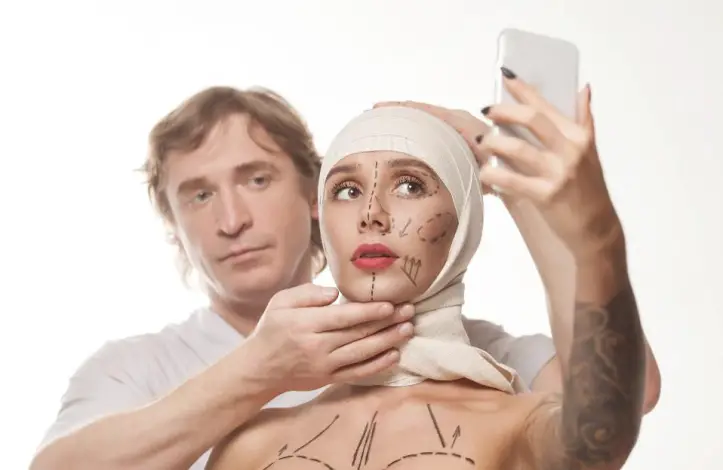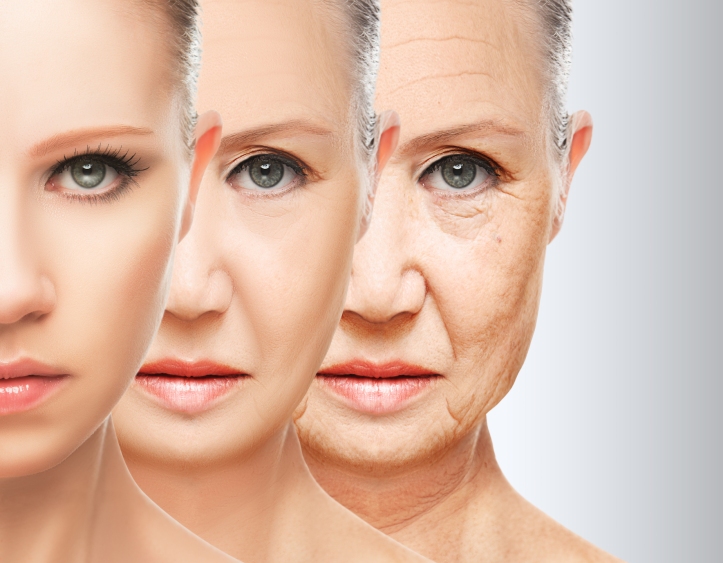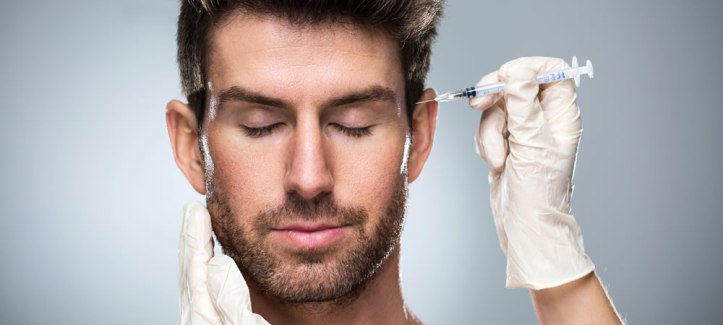Saturday September 14, 2019 By: Gihan Shahine
Gihan Shahine Examines The Craze For Cosmetic Procedures in Egypt Which Is No Longer Reserved To People From A Single Social Class Or Gender. Ahram Weekly, 2017

It is 9am in a branch of one of Egypt’s most famous private eye hospitals in the working class district of Al-Sayeda Aisha. The clinic is teeming with patients from different social classes and backgrounds. Most patients seem to be seeking professional medical advice, but many are also opting for surgical and non-surgical cosmetic procedures, including rectifying upper and lower eye-lids, Botox and filler injections.
“It’s been years since I had cosmetic surgery on my eye-lids, but whenever I look back I feel glad I made the right decision,” 48-year-old Mona (not her real name) said, expressing her satisfaction. A well-off divorced housewife who likes to wear expensive branded clothes, Mona is waiting for her brother to come out of a similar surgery to remove bags from his lower eye-lids.
Mona’s looks were probably a source of encouragement for her brother to go for more or less the same surgery. Mona’s eye-lids are tightly lifted, giving a youthful look to her green eyes that look rounded under her neatly tattooed eyebrows. Her face is smooth, the absence of any wrinkle of expression on her face is unmistakable, her cheekbones are somewhat plump and she has had her lips permanently coloured. Mona has no difficulty in admitting that she has gone under the knife in order to achieve her current surgically-enhanced beauty. “Everybody is doing it,” she shrugs.

Her first introduction to cosmetic surgery was when she was in her late thirties when she wanted to remove the bags from her lower eye-lids and extra tissue on her upper lids. However, since then she has also undergone other minor procedures, including Botox, fillers, laser treatment, permanent make-up, tattooing and laser hair-removal. Her friends have also been through similar experiences, having different procedures ranging from nose jobs to cheek plumps, tummy tucks and teeth whitening. “It really makes a difference psychologically; in fact, it is a beautiful experience,” Mona said in an assertive tone. “After I underwent the surgery, everybody said there was a major change in my looks. I practically lost ten years off my age as a result of going a few hours under the knife. That was a great feeling, and it’s worth the money to me,” she said.
Mona is not alone. Plastic surgery and minor cosmetic procedures have become common worldwide to the extent that they have grabbed the attention of the world’s psychologists and sociologists who have been eager to examine the phenomenon.
Although plastic surgery has been around for decades, in the past it has been largely confined to those having a deformity from birth or due to an accident. It has also been more widespread among cinema and TV stars. Today, however, Mona says that almost all the people she knows in her circle, men and women, single and married, ranging from their mid-twenties to over sixties, have undergone a minor or major cosmetic procedure. The consensus among observers is that the trend has recently also become rife in Egypt’s lower and middle classes and among men, who are now said to constitute almost 40 per cent of all those undergoing cosmetic procedures.

NO LONGER A LUXURY: 28-year-old Zeinab, a single caregiver for the elderly who earns LE 6,000 a month on average, seems to shrug off her daily fights with her mother over cosmetic procedures. Zeinab’s mother argues against lavishing money on tattoos and tummy tucks, but Zeinab, who comes from a low-income family living in the working class district of Ain Shams in Cairo, cannot quit her “obsession.”
“I understand my mother has other priorities in the light of the current inflation,” Zeinab concedes, pulling her lips to one side of her face, perhaps in regret. But she soon bends over the object of her latest passion, her mobile phone. Like many other people, Zeinab is addicted to posting new pictures everyday on WhatsApp and Facebook, perhaps in search of more likes for her improved looks.
A recent Reuters article also attempted to gauge this growing trend among working-class Egyptians, suspecting that “working-class Egyptians are getting Botox, breast implants and tummy tucks in the hope that the cosmetic surgery once reserved for a wealthy elite will boost their own marriage and job prospects.”
“Illiterate housewives fearing abandonment, soldiers mocked for flabby chests and overweight women struggling to find a husband sometimes pay with their own blood, rely on charity, borrow money from family and friends or turn to unlicenced cut-price private clinics for procedures,” the Reuters article wrote.
Hossam Foda, a professor of facial plastic surgery at the Alexandria Medical School, agrees that cosmetic surgery is no longer reserved to the wealthy classes or to female clients. “The revolution in cosmetic techniques and their improved results, reported on 24-hour news, have encouraged people belonging to the middle and lower social strata to jump onto the beautification wagon band,” Foda told the Weekly.

Sociologist Hoda Zakariya says the craze is the product of media propaganda that tends to focus on the beauty of the body rather than the intellect, wit or soul. It focuses on presenting dancers and movie stars, rather than intellectuals and scientists, as the models that society should follow. “Women may lose self-esteem if they do not fit into the mould introduced by the media,” she said. “And just like any woman wanting to feel feminine, those belonging to the working class have been the first prey of the media propaganda, perhaps with many less-educated women feeling that it will make them look like women from the higher classes.”
The fact that society puts a greater emphasis on looks rather than wits has also been a strong drive for doctors who “would rather focus on advancing beauty techniques in their labs than finding a solution for such endemic diseases as bilharzia, for instance, because they know the beauty business will always sell,” according to Zakariya. “Doctors and fashion designers are the ones who have created this beauty craze because it is a product that sells,” she added.
Many plastic surgeons would agreethat “the spread of social media has been a strong drive behind many patients’ cravings for better looks.” And a study released recently by the American Academy of Facial Plastic and Reconstructive Surgery similarly showed that “one in three surveyed doctors have seen an increase in requests for surgery due to patients’ dissatisfaction with their image on social media.”.
Foda has now beautified more 6,000 noses in Egypt and he insists that almost all his women patients had taken the decision to undergo the surgery on their own without any pressure even from their husbands. “They just do it for their own sakes, not for the sake of their husbands as many seem to believe. They do it to feel more confident and empowered and to stop shying away from cameras and the rest of society,” Foda told the Weekly.
Foda explains the trend in favour of more cosmetic surgery in the light of the achievement of better self-satisfaction and higher self-esteem. It is a kind of personal empowerment, which, he insists, applies to both sexes. “More and more men are seeking cosmetic procedures because they feel that improving their appearance helps them fit into society better, especially those working in business and politics,” Foda said.

IMAGE AND SOCIAL ACCEPTANCE: Recent studies of the importance of body image in society have concluded that “attractive people have distinct advantages,” for example. “Concern about appearance is quite normal and understandable,” wrote a recent UK study entitled “Why we look in the mirror”. The study, issued by the UK-based non-profit organisation Social Issues Research Centre (SIRC), argues that attractive children are more popular with classmates and teachers, attractive applicants have a better chance of getting a job and receiving higher salaries, and attractive people may even be found guilty less often in court.
“The ‘bias for beauty’ operates in almost all social situations, and all the experiments show we react more favourably to physically attractive people,” the SIRC study concluded. The study also shows that this is not confined to women only, as “in most recent research there is some evidence of an increase in body-dissatisfaction among males.”
“As well as some early-adolescent boys, men undergoing the so-called ‘male menopause’ or mid-life crisis – i.e. men between the ages of about 45 and 55 – are most likely to be dissatisfied with their appearance,” according to the SIRC.
This could help explain the increasing numbers of men resorting to cosmetic procedures in Egypt.
Article was originally published by Ahram Weekly on June 22, 2017
***If you liked this article, don’t forget to subscribe to our newsletter and receive our articles by email.
